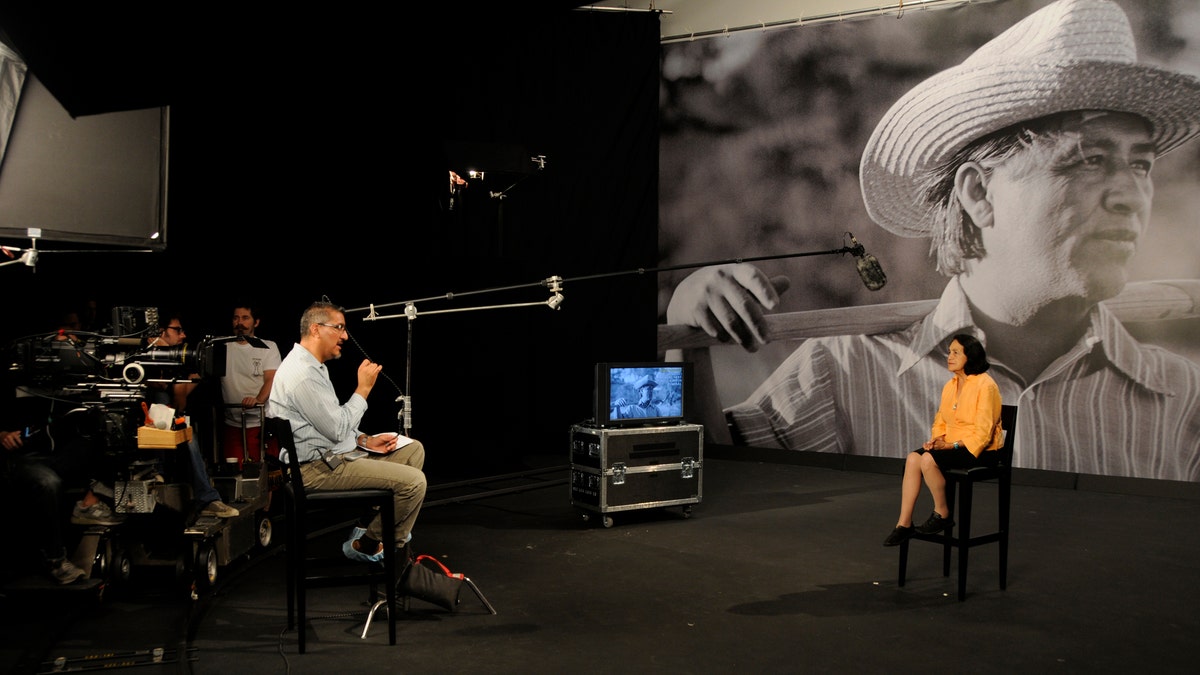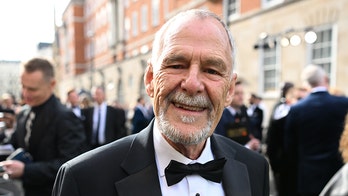
Director Richard Ray Perez, left, with United Farm Workers co-founder, Dolores Huerta, on the set of "Cesar's Last Fast." (Photo: Martin Cox; Background image: Cathy Murphy.)
Park City, Utah – He is a legend, his name is practically synonymous with farm workers' rights.
But to much of the American public, Cesar Chavez remains largely an enigma.
A documentary presented at the Sundance film festival aims to change that.
The film, “Cesar’s Last Fast,” tells the story of how Cesar Chavez, who died in 1993, used spirituality and leadership to turn himself from an ordinary farm worker to a labor leader and civil rights advocate who created a movement that fought for better working conditions for farm laborers in California.
“I think his story has been largely overlooked in the larger American narrative,” said Richard Ray Perez, the film’s director.
Perez said that bringing “Cesar’s Last Fast” to the festival marks a general shift in American culture towards recognizing Latino history.
“I describe it as sort of a dam," he said. "You can no longer hold back the power of our stories and that our stories are also American stories. I think screening at Sundance and premiering here is an acknowledgment of the universal themes and the universality of Cesar’s leadership.”
Coming from a family of farmers himself, Perez hopes to pay tribute to his own roots as well as inspire others to take a stand and organize themselves to make changes for the better.
“Making this film is a way to tell [my family's] stories and to bring to light living conditions and working conditions that they experienced and that motivated Cesar Chavez to organize and really lead that movement,” he said.
A polarizing, controversial figure for many, Chavez led workers’ strikes, a boycott of California table grapes and fasted two times in an attempt to create awareness of farmers’ struggles. His efforts eventually led to the widespread recognition of the United Farm Workers Union and to better conditions for farm laborers.
The documentary centers on Chavez's second fast, which lasted 36 days in the summer of 1988. Cinematographer James Chressanthsis, who shot much of the original footage, told Fox News Latino that it was the most important thing he has ever filmed. He added that Chavez’s work is just as relevant today as it was when he was alive.
“This film is more timely now with the plight of low wage workers, environmental destruction, environmental justice and injustice,” he said. “And injustice is being done especially to communities of the poor and people of color.”
The film is causing many Latinos—in and out of the Sundance community—to yearn for change.
“It was a very powerful movie, but I think it’s important that the people do their homework after watching this movie because the fight’s not over,” said festival attendee and former farm worker Michael Perez. “There’s still a lot of the same issues happening everywhere in all states where the migrant workers work because it’s easy to exploit migrant workers,” he said. "Migrant people period."
This Saturday, Latinos plan to rally outside a screening of “Cesar’s Last Fast” in Salt Lake City. Salvador Lazalde, the director of the Utah chapter of the League of United Latin American Citizens (LULAC), which is leading the rally, said the group hopes to spread awareness about the impact Chavez has had.
“First, we need to learn from Cesar Chavez and what he did. Second, we need to follow his example of what he did,” said Lazalde.
Although Chavez’s activism brought higher wages and improved labor conditions for workers, he his continued working to improve life for his fellow agriculturists up until his death in 1993.
“Each of us has the power to do something and we should do something. Whether it’s voting, whether it’s volunteering, but it’s speaking out and not being silent in the face of injustice,” said Chressanthis.
This Sundance debut is not the only cinematic attention that Cesar Chavez will be getting this year. Diego Luna’s documentary, “Cesar Chavez: An American Hero,” will take the spotlight when it premieres at the Berlin International Film Festival next month.
Follow us on twitter.com/foxnewslatino
Like us at facebook.com/foxnewslatino






